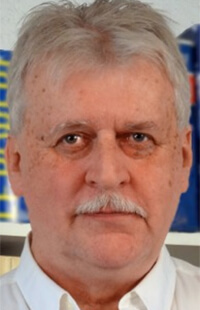
To help authors market their books and and to help create greater awareness, we occasionally feature winning stories submitted to our 50 Great Writers You Should Be Reading Awards Contest on this blog. The journey to success is often a long one. We hope the stories of successful authors will provide some encouragement and help others overcome the challenges they face. This story was submitted by Wayne Clark.

Author Wayne Clark
It was a hot day, which was probably why I enjoyed the cool darkness of the basement as I sat on my knees sifting through the contents of an old steamer trunk that belonged to my parents. Nothing was in obvious disarray. Postcards and photos were enclosed in larger envelopes, old photography magazines were neatly stacked to one side on the bottom of the trunk. There was even an appliance or two, probably because such things were made better then, and my parents grew up in an age where you didn’t waste things. To the right, at the back and standing on end, was a thick, black ringed binder. I rose from my knees and reached. Wedging my fingers on each side of the binder, I edged it up and out of what likely had been its home for many a year. Settling back on the hard concrete floor, I opened the binder. I believe I was 14 at the time, and though I can’t remember who won the World Series that year I am almost positive the first page of the binder’s contents read something like, “Newspaper Institute of America”. There was a New York City address at the bottom of the page. It was a step-by-exciting-step course on how to be a newspaperman, describing what news was, how to report it — never forget to keep your eye peeled for a pay phone to call in your story — and, finally, how to write it. I was hooked.
It turned out to be a correspondence course my father had taken at the height of the Great Depression while working for a small town newspaper and turning his entire weekly pay envelope over to his father to help support their family of nine. He went on to work in a steel mill, then signed up in 1939 to fight in World War II.
The night I found the binder I read every word of it. Within days I was writing news stories of imaginary events, learning to properly position my five Ws, the who, what, why, when and where that ordered a news story’s elements like tomatoes on a tutor. I then started folding sheets of paper, “copy paper” in my mind, as the newspaper course recommended when going out on assignment. The folded sheets would have fit in my suit jacket pocket had I been grown up and had a jacket. I used the paper to take notes as I listened to a ball game on radio, then would start typing my story between innings, leaving room for a lead that the result would determine.
In no time, I wanted to be a newspaperman more than I wanted to finish school. Within a couple of years I hounded one of the local papers until they gave me a chance to write a story for their youth section, without pay of course. Not long after turning 17, I had a job. I was a newspaper man, and I had a suit jacket. There was always copy paper in the pockets.
To this day I take notes when anything strikes me strange, or particularly beautiful or sad. Whether these things are before my eyes or just in my head doesn’t matter. By my early 20s, I had graduated to notepads and had begun keeping journals, which I do to this day. They contain mostly personal musings, but that is where observations and story and character fragments come to rest. Letting ideas go unrecorded is somehow a waste of living. Thought is as important as action.
By the time I had switched to notepads, I had also begun trying my hand at fiction. My first completed effort was a radio play. It didn’t go anywhere because there were too many characters for the producer’s budget, but I had learned something. Writing fiction was much harder than putting together a news story, where you start out at the end, as it were. In fiction you had to breathe life into imaginary beings, give them thought and feeling. You had to create a street curb for them to sit on, a telephone pole for them to lean on, a ham sandwich to eat.
I had begun working for magazines by then, and the five Ws no longer had dictatorial powers. A good magazine writer needs a true writer’s eye for human nature in all its forms, not just drama and conflict. It took a long time to stop announcing my story, as in the street vendor’s cry of “Hear ye! Hear ye! Read all about it!… Man bites dog!” In time I learned to write a story that revealed itself.
When my emotional NASDAQ was bullish, I undertook to write novels. To this day I have only one novel on the market, my contemporary fiction work entitled he & She. However over the decades I did complete, or all but complete, four other books. In some cases, the deeper I got into the story the more I knew it was not right somehow. In one case, I thought I’d actually done it, written a publishable novel. Then, suddenly, I lost all interest in it. It had become dead to me. I never reread it. I knew I wouldn’t like it. It was if I’d taken a step back from a relationship that once seemed grand and realized now there was nothing there.
What I’ve learned as a writer is that just as important as those attempts at novels are the attempts at turning my “notebook” observations into scenes; not even short stories, just scenes. Telling myself I’m going to write a novel is the fastest way to induce paralysis. Speculating on an idea for a novel is fine, and to be encouraged. Doing so turbocharges the creative juices, forges links. But when it comes to writing I’ve learned to find my pleasure in creating a scene, one I or anyone else reading it could easily visualize. Sometimes the scenes end there. As a writer, I still get satisfaction from having spent my day writing that scene. Other times, by the time I’m finishing the scene, it is begging to go somewhere else. That’s when I get excited about getting up the next morning to find out where Scene 2 takes me. It may very well lead me to integrate ideas I’ve already had about a possible novel. But I can’t keep all those ideas in my consciousness all at once. I need to let the creative part of me cherry-pick those ideas, even without my permission.
Find out more about Wayne’s book by visiting his website, http://www.wayne-clark.com.